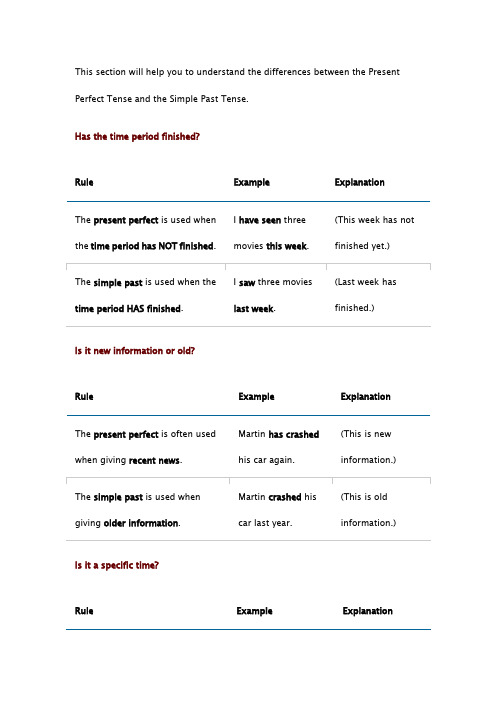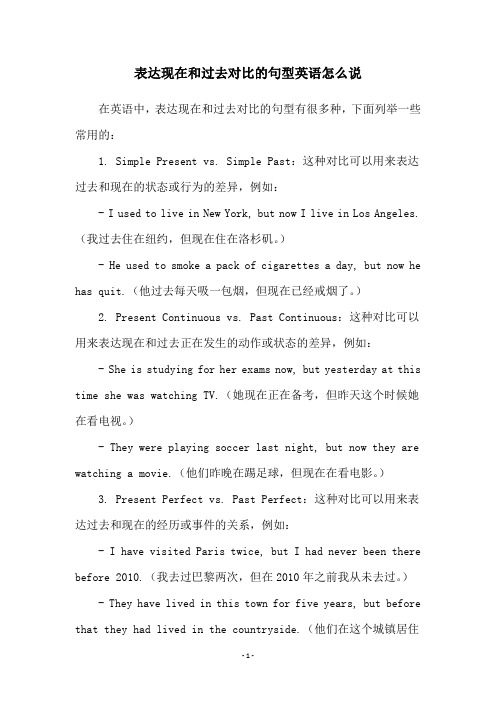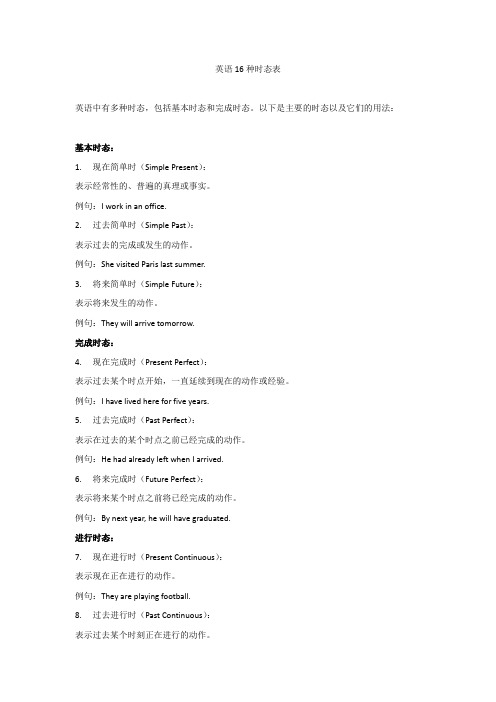Simple Past VS Past Perfect
simple past & present perfect

This section will help you to understand the differences between the Present Perfect Tense and the Simple Past Tense.Has the time period finished?Is it new information or old?Is it a specific time?Has the action finished (sente nces with “for” or “since”)?1.I _____the movie Titanic three times. I'm going to see it again tonight.A. sawB. have seen(((These are recent actions, and the speaker hasn't finished going to see the2. The Titanic ________ in 1912.A. sankB. has sunkThis action happened at a specific time (in 1912).3. Somebody ________ my bicycle! Now I'll have to walk home.A.stoleB. has stolenThe present perfect is best here because the action is recent, and it is affecting the present.4. When Young Hee was a child, she ________ in Seoul.A.lived B. has livedThis action took place at a specific time in the past (when Young Hee was a child).5. Ouch! ________ my finger!A. I cutB. I’ve cutThis action has only just happened.6. I ________ to work every day for the last six weeks!A. walkedB. have walkedThe present perfect is used with actions which started in the past and are still continuing, especially with for and since.7. Gerry ________ off his bike three times this month.A. fellB. has fallenThe time period ("this month") hasn't finished yet, so we would use the present8. Chika ________ from university last July.A. graduatedB. has graduatedThis action happened at a specific time in the past, so we would use the simple past.9. Joji ________ in Tokyo for five years, but he left in 1993.A. livedB. has livedThe simple past is right here because the action finished several years ago.10.。
英语最基本十二种时态配例句详解

英语最基本十二种时态配例句详解Tense and aspect, although they are two different categories, always appear together. There are six tenses and two aspects in English. With reference to tense and aspect, we can speak about the following structures in practical usage. All English Tenses with Examples!时态和体虽然是两个不同的范畴,但总是同时出现的。
英语有六个时态和两个方面。
关于时态和体,我们可以在实际使用中谈一下以下结构。
全英语时态举例。
(Note: progressive aspect is often called continuous.)(注:进行体通常称为连续体。
)NO. 1、present simple一般现在时Tenses: Present Simple (present tense + common aspect)时态:现在简单(现在时态+共同体)Affirmative肯定句Affirmative: Subject + Base Form of the Verb肯定句:主语+动词的基本形式*note: for 3rd Person Singular (he/ she/ it) add ‘s’ to the base form*注:对于第三人称单数(he/she/it),在基表中添加“s”I/ You/ We/ They work in a bank.我/你/我们/他们在银行工作。
He/ She works in a bank.他/她在银行工作。
Negative否定句Negative: Subject + don’t/ doesn’t + Base Form of the Verb动词:主语+don’t/ doesn’t +动词的基本形式I/ You/ We/ They don’t (do not) work.我/你/我们/他们不工作。
Past perfect and past simple

Past perfect and past simple compared:
The past simple tense
The past perfect tense
In 1976, 60% of families were couples with children.
By 1996, this had fallen to 51%.
.
The film had already begun by the time we got to the cinema. She had just stepped into her office when the telephone rang
6
We use the past perfect when we say what we wanted or hoped to do, but didn’t: 表示过去未曾实现的愿望,打算,想法或意图等。 类似的词:expect (to), mean (to), think (about+-ing), suppose
过去完成时的主要用法是表示两个事件中哪一个发生在前,表 示过去的过去用过去完成时。离现在时间最近的动作用一般过 去时,表示依次发生在过去的动作应用一般过去时,若有时间 间隔,有强调动作的先后概念,宜用过去完成时)
Attention: with already and just (=a very short time before) we use the past perfect, not the past simple:
In 1981, 34% of children aged 2024 lived with their parents.
表达现在和过去对比的句型英语怎么说

表达现在和过去对比的句型英语怎么说在英语中,表达现在和过去对比的句型有很多种,下面列举一些常用的:1. Simple Present vs. Simple Past:这种对比可以用来表达过去和现在的状态或行为的差异,例如:- I used to live in New York, but now I live in Los Angeles.(我过去住在纽约,但现在住在洛杉矶。
)- He used to smoke a pack of cigarettes a day, but now he has quit.(他过去每天吸一包烟,但现在已经戒烟了。
)2. Present Continuous vs. Past Continuous:这种对比可以用来表达现在和过去正在发生的动作或状态的差异,例如:- She is studying for her exams now, but yesterday at this time she was watching TV.(她现在正在备考,但昨天这个时候她在看电视。
)- They were playing soccer last night, but now they are watching a movie.(他们昨晚在踢足球,但现在在看电影。
)3. Present Perfect vs. Past Perfect:这种对比可以用来表达过去和现在的经历或事件的关系,例如:- I have visited Paris twice, but I had never been there before 2010.(我去过巴黎两次,但在2010年之前我从未去过。
)- They have lived in this town for five years, but before that they had lived in the countryside.(他们在这个城镇居住了五年,但在此之前他们住在乡下。
英语16种时态表

英语16种时态表英语中有多种时态,包括基本时态和完成时态。
以下是主要的时态以及它们的用法:基本时态:1.现在简单时(Simple Present):表示经常性的、普遍的真理或事实。
例句:I work in an office.2.过去简单时(Simple Past):表示过去的完成或发生的动作。
例句:She visited Paris last summer.3.将来简单时(Simple Future):表示将来发生的动作。
例句:They will arrive tomorrow.完成时态:4.现在完成时(Present Perfect):表示过去某个时点开始,一直延续到现在的动作或经验。
例句:I have lived here for five years.5.过去完成时(Past Perfect):表示在过去的某个时点之前已经完成的动作。
例句:He had already left when I arrived.6.将来完成时(Future Perfect):表示将来某个时点之前将已经完成的动作。
例句:By next year, he will have graduated.进行时态:7.现在进行时(Present Continuous):表示现在正在进行的动作。
例句:They are playing football.8.过去进行时(Past Continuous):表示过去某个时刻正在进行的动作。
例句:I was reading a book when the phone rang.9.将来进行时(Future Continuous):表示将来某个时刻正在进行的动作。
例句:This time tomorrow, we will be traveling.完成进行时态:10.现在完成进行时(Present Perfect Continuous):表示从过去某时点开始一直持续到现在的动作。
例句:I have been working on this project for two hours.11.过去完成进行时(Past Perfect Continuous):表示在过去某时点之前一直持续到过去的动作。
百词斩英语12种时态

百词斩英语12种时态present simple一般现在时Tenses: Present Simple (present tense + common aspect) 时态:现在简单(现在时态+共同体)2. General existence; stating a fact:2.普遍存在;陈述事实:3. Dramatic narrative (theatre, sports, etc. events):3.戏剧叙事(戏剧、体育等活动):Johnson takes the ball, he bounces it to the floor, then he throws and scores two points.约翰逊接过球,把球弹到地板上,然后投进并得到2分。
present progressive现在进行时Present Progressive (present tense + progressive aspect) 现在进行时(现在时+进行体)1. Action happening now:1.正在进行的动作past simple一般过去时Tenses: Past Simple (past tense + common aspect)时态:过去式(过去式+共同体)Actions, events in the past:过去的行动、事件:Past Progressive过去进行式Tenses: Past Progressive (past tense + progressive aspect) 时态:过去进行时(过去时+进行体)Action in progress in the past:过去正在采取的行动:Present Perfect Simple (present perfect tense + common aspect)一般现在完成时(现在完成时+共同体)2. Action in incomplete time:2.不完全时间内的行动:3. Action in the past without saying when:过去的行动,不说何时:4. Action beginning in the past and still continuing:4.过去开始并仍在继续的行动:Present Perfect Progressive现在完成进行时Present Perfect Progressive (present perfect tense + progressive aspect)现在完成进行体(现在完成时+进行体)Past Perfect Simple过去完成时Past Perfect Simple (past tense + common aspect)一般过去时(过去时+共同体)Past Perfect Progressive过去完成进行时Past Perfect Progressive (past perfect tense + progressive aspect)过去进行时Fact, action or event in the future:未来的事实、行动或事件:Future Progressive进步的未来Future Progressive (future tense + progressive aspect) 将来进行体(将来时+进行体)Future Perfect Simple将来完成时Future Perfect Simple (future perfect tense + common aspect)将来完成时态+共同部分Future Perfect Progressive将来完成进行时Future Perfect Progressive (future perfect tense + progressive aspect)将来完成进行体(将来完成时+进行体)。
动词时态精讲与最新高效口诀
动词时态精讲与最新高效口诀动词的时态是指动作发生的时间。
在英语中,动词的时态分为一般现在时、一般过去时、一般将来时以及完成时等几种。
以下是每个时态的精讲与最新高效口诀。
1. 一般现在时(Simple Present)一般现在时表示经常性的、普遍的、一贯的动作。
第三人称单数使用动词原形的加“s”。
口诀:he、she、it 加斯;主词加s 谓语快。
2. 一般过去时(Simple Past)一般过去时表示过去发生的动作或状态。
大部分动词过去式加“ed”,不规则动词则需记忆。
口诀:昨天用过去,动词ed;看原型特征,记不规。
3. 一般将来时(Simple Future)一般将来时表示将来发生的动作。
使用助动词“will”或“shall”,加动词原形表示。
口诀:将来到,我要做;加will、原形走。
4. 现在进行时(Present Continuous)现在进行时表示正在进行的动作。
动词be的形式+现在分词(动词ing形式)构成。
口诀:现在要进行,be动词先行;加ing作伴,在现场。
5. 过去进行时(Past Continuous)过去进行时表示过去一些时间段内进行的动作。
口诀:过去的进行,过去态助动词;be动词加ing,细节明。
6. 将来进行时(Future Continuous)将来进行时表示将来一些时间段内会进行的动作。
口诀:将来再行动,助动词will换上;be动词加ing,接下来。
7. 现在完成时(Present Perfect)现在完成时表示过去时开始,持续到现在的动作或经验。
口诀:把握住,现在写;has、have和Ved,切勿忾怀。
8. 过去完成时(Past Perfect)过去完成时表示过去时前发生的动作或经验。
口诀:过去定,过去加;had和动词ed,时间序。
9. 将来完成时(Future Perfect)将来完成时表示将来一些时间之前已经完成的动作。
口诀:将来写动作已完成,will have 替你出场。
past perfect&past simple
2. Benjamin Button: And if only one thing had happened differently; if that shoelace hadn't broken, or that delivery truck had moved moments earlier, or that package had been wrapped and ready, because the girl hadn't broken up with her boyfriend, or that man had set his alarm and got up five minutes earlier, or that taxi driver hadn't stopped for a cup of coffee, or that woman had remembered her coat and had gotten into an earlier cab, Daisy and her friend would have crossed the street, and the taxi would have driven by. But life being what it is, a series of intersecting lives and incidents, out of anyone's control--that taxi did not go by, and that driver was momentarily distracted, and that taxi hit Daisy, and her leg was crushed.
德语过去式动词变位
simple past of
werden
ich wurde du wurdest er/sie/es wurde Sie wurden wir wurden ihr wurdet sie wurden Sie wurden
wir Sie ich könnent du te st er n ihr sie
endings for simple past of strong verbs
The ich and er/sie/es pronouns have no endings for strong verbs in the simple past.
ich ~ du ~st er/sie/es ~ Sie ~en
Past Perfect
Chapter 11
Ich bin gegangen.
Past Perfect
Ich war gegangen.
Ich habe geschlafen.
Ich hatte geschlafen.
use the simple past form of the helping auxilliary verb haben or sein
wir ~en ihr ~t sie ~en Sie ~en
Das Ende
Vielen Dank
Simple Past Tense Past Perfect
Lizz Caplan-Carbin
Simple Past Tense
He came to my house. Past Perfect I had already left. He came to my house after I had already left.
(完整版)我的德语语法总结,推荐文档
(完整版)我的德语语法总结,推荐文档时态German 德语English 英语Present Tenses 现在时态Pr?sens:现在时Simple Present:一般现在式Present Continuous现在进行时Er spielt.He plays.He is playing.Past Tenses 过去时态Imperfekt:过去时Simple Past:一般过去式Past Continuous过去进行式Er spielte.He played.He was playing.Perfect Tenses 完成时态Perfekt:现在完成时Present Perfect:现在完成式Present Perfect Continuous现在完成进行式Er hat gespielt.He has played.He has been playing. Past Perfect Tenses 过去完成时态Plusquamperfekt:过去完成时Past Perfect:过去完成式Past Perfect Continuous过去完成进行式Er hatte gespielt.He had played.He had been playing. Future Tenses 将来时态Futur I:第一将来时Future:将来时Future Continuous将来进行时Er wird spielen.He will play.He is going to play.He will be playing.Future Perfect Tenses 将来完成时态Futur II:第二将来时Future Perfect:将来完成时Future Pefect Continuous将来完成进行时Er wird gespielt haben.He will have played.He will have been playing.1、现在时变位形式machen arbeiten sein wissen haben werden词尾ich mache arbeite bin wei?habe werde-e du machst arbeitest bist wei?t hast wirst-(e)st er/sie/es macht arbeitet ist wei?hat wird-(e)t wir machen arbeiten sind wissen haben werden-en ihr macht arbeitet seid wi?t habt werdet-(e)t Sie, sie machen arbeiten sind wissen haben werden-en 另外一些不规则变化动词2、过去时变位形式machen fahren sein wissen haben werden词尾ich machte fuhr war wu?te hatte wurde-du machtest fuhrst warst wu?test hattest wurdest-st er/sie/es machte fuhr war wu?te hatte wurde-wir machten fuhren waren wu?ten hatten wurden-en ihr machtet fuhrt wart wu?tet hattet wurdet- t Sie, sie machten fuhren waren wu?ten hatten wurden-en另外一些不规则变化动词3、情态动词dürfen k?nnen müssen sollen wollen m?gen现在时ich darf kann mu?soll will magdu darfst kannst mu?t sollst willst magster/sie/es darf kann mu?soll will magwir dürfen k?nnen müssen sollen wollen m?genihr dürft k?nnt mü?t sollen wollen m?genSie, sie dürfen k?nnen müssen sollen wollen m?gen过去式er/sie/es durfte konnte mu?te sollte wollte mochte第二分词er/sie/es gedurft gekonnt gemu?t gesollt gewollt gemocht4、命令式a.du的命令式动词去掉词尾-n,不加人称du,此为-e大多可去掉,只有动词词干以-d,-t,-ig,-chn,-ffn,-er,-el结尾时,-e才必须保留。
- 1、下载文档前请自行甄别文档内容的完整性,平台不提供额外的编辑、内容补充、找答案等附加服务。
- 2、"仅部分预览"的文档,不可在线预览部分如存在完整性等问题,可反馈申请退款(可完整预览的文档不适用该条件!)。
- 3、如文档侵犯您的权益,请联系客服反馈,我们会尽快为您处理(人工客服工作时间:9:00-18:30)。
过去完成时
• 一、构成方法 • 由had加动词的过去分词构成。 • 二、用法说明 • ■表示在过去某一时刻或某一动作之前已经完成 了的动作,即“过去的过去”。如: • She said she had never been to Paris. 她告诉我 她曾去过巴黎。 • When the police arrived, the thieves had run away. 警察到达时,小偷们早就跑了。 • By the time he was twelve, Edison had begun to make a living by himself. 到了十二岁那年,爱迪 生开始,可用一般过 去时。如: • When I heard the news, I was very excited. 我听到那个消息时,非常高兴。
• 3. 叙述历史事实,可用一般过去时。如: • Our teacher told us that Columbus discovered America in 1492. 我们老师告诉 我们哥伦布于1492年发现了美洲。
• • • • •
■用于下列4个特殊句型中: 1. hardly…when…, no sooner…than… 2. It/ That /This was the first time that… 3. It was+时间段+since 4. …than sb. had thought /expected /hoped /wanted等。
• Hardly had I opened the door when he told me. 我刚开开门,他就告诉了我。 • He had no sooner bought the car than he sold it. 他刚买了这辆车,转眼又卖了。 • It was the second time he had been out with her. 这是他第二次和她一道出去。 • It was more than a year now since he had seen her. 他上次见她以来已经一年多了。 • We arrived earlier than we had expected. 我们到 得比预料的早。
Simple Past VS Past Perfect
一般过去时
• 一、构成方法 • 用动词的一般过去式,即在动词原形后加ed。 • 二、用法说明 • ■表示在过去某个时间所发生的动作或所处的状 态。常与yesterday, last week, in 1989, just now, a moment ago, the other day等连用。如: • He was here just now. 他刚才还在这里。 • What did you do yesterday? 你昨天做了什么事?
• 注意:过去完成时是一种相对时态,一定要有一 个作参照的过去时间或过去动作作比较,否则, 就不能用过去完成时。但下列3种情况虽然有是先 后发生的两个过去动词,却同用一般过去时: • 1. 先后发生的一系列动作,但并不强调先后时, 最后两个动词用then,and,but 等连接。如: • On Saturday afternoon, Mrs. Green went to the market, bought some bananas and visited her cousin. 星期下午,格林夫人去了市场,买了些香 蕉,然后去看望了她的表姐。
• ■表示从过去某一时刻开始一直延续到另 一过去时刻的动作或状态。跟现在完成时 一样,也常与how long, for three days, before等表示一段时间的状语连用。如: • When Jack arrived he learned Mary had been away for almost an hour. 当杰克到来 时,他才了解到玛丽已经离开差不多一个 小时了。
• ■表示未曾实现的希望或打算。表示希望或打算 的动词,如hope, want, expect, think, suppose, plan, mean, intend等的过去完成时,后接不定式 to do时,表示未曾实现的希望或打算,即“本来 希望或打算做某事(但却没做) ”。如: • I had hoped to send him a Christmas card,but I forgot to do so. 我本来希望寄给他一张圣诞卡的, 但我忘了寄了。 • I had intended to come over to see you last night, but someone called and I couldn’t get away. 昨 晚我本想去看你的,但有人来了我走不开。
• ■在过去一段时间内的经常性或习惯性动作。如: • We often played together when we were children. 我们小时候常在一起玩。
• 注:表示过去经常发生的动作还可用used to 和 would。如: • He used to smoke a lot, but he doesn’t now. 他 过去经常抽烟,但现在不抽了。 • Whenever we were in trouble, he would help us. 每当我们遇到困难,他都会帮助我们。
• 注意: • 1. 表示一系列的动作,尽管有先后,都用一般过 去时,最后两个动词之间用and连结。如: • He opened the door, rushed out and then disappeared. 他开开门,冲了出去,然后就消失 了。 • 2. 注意在语境中理解“我刚才/原来还不……”。 如: • —Your phone number again? I didn’t quite catch it. —It’s 2566666. 请再说一次你的电话号码,好 吗?我刚才没听清楚。是2566666。
• ■表示主语过去的特征或性格。如: • At that time she was very good at English. 那时 她英语学得很好。 • ■用在状语从句中表示过去将来。如: • He said he would wait until they came back. • ■表示现在,多与want, hope, wonder, think, intend等动词连用,使语气更委婉。如: • I wondered if you could help me. 不知你能不能 帮我一下。 • 有时也是时态一致的需要。如: • I didn’t know you were here. 没想到你在这里。
